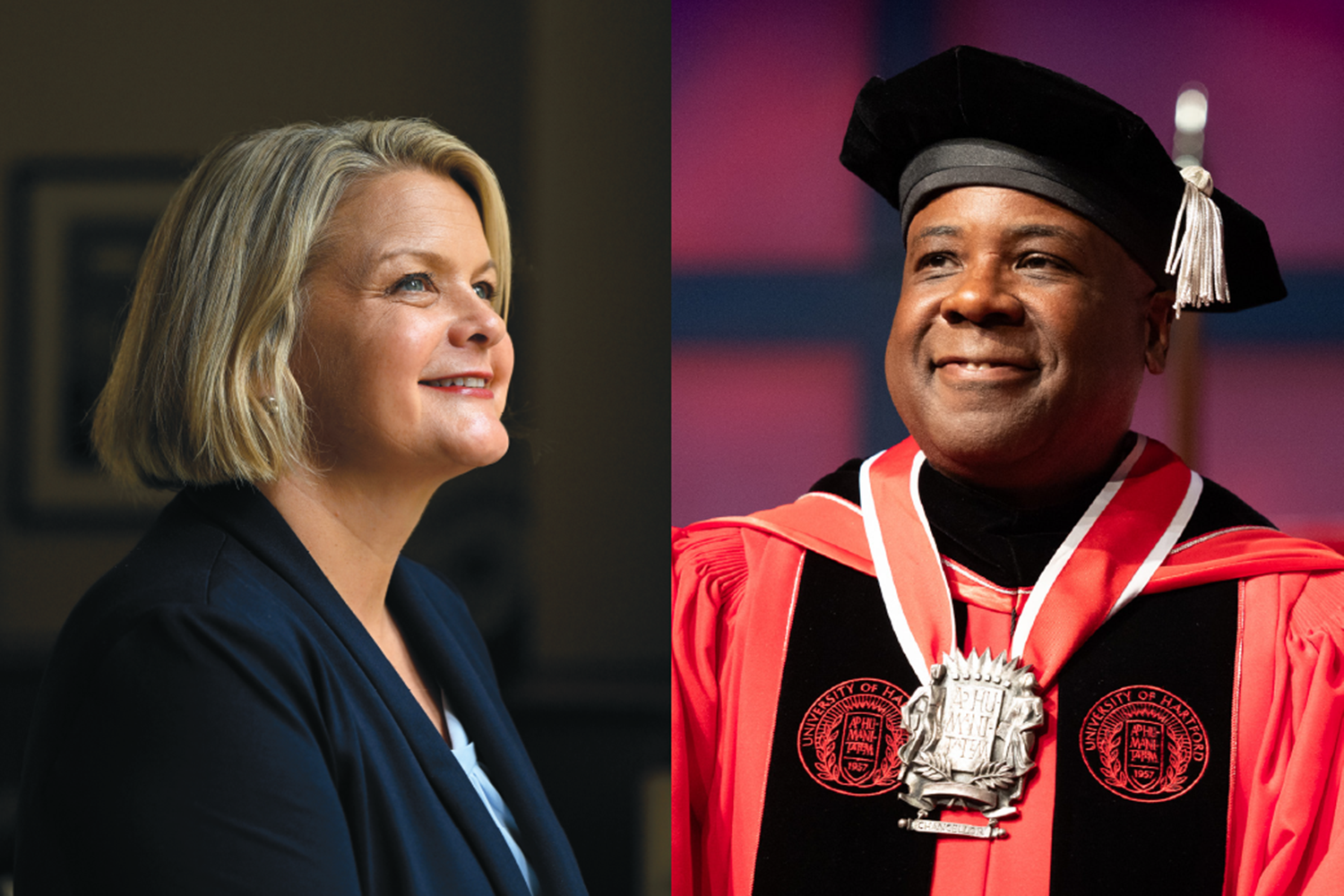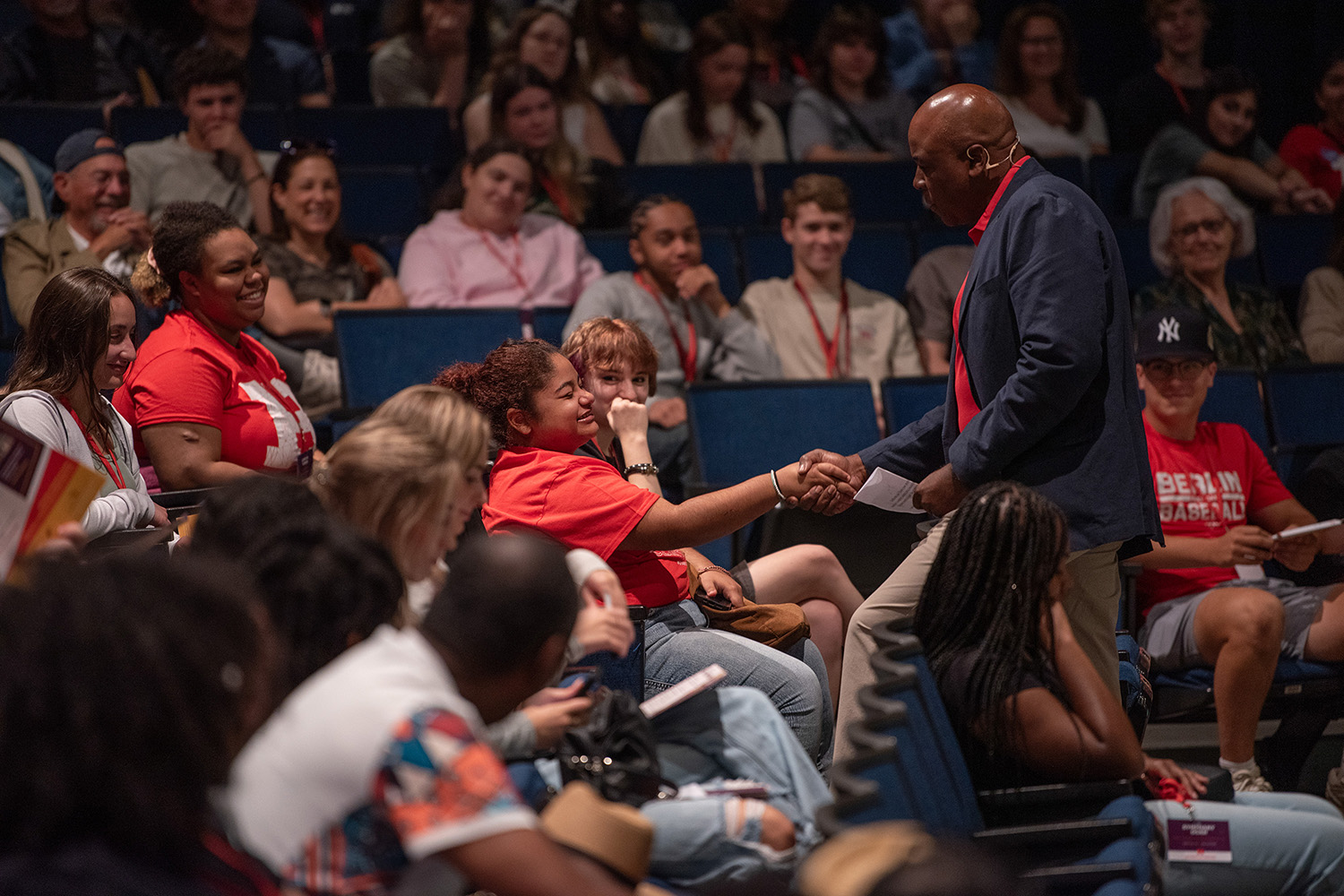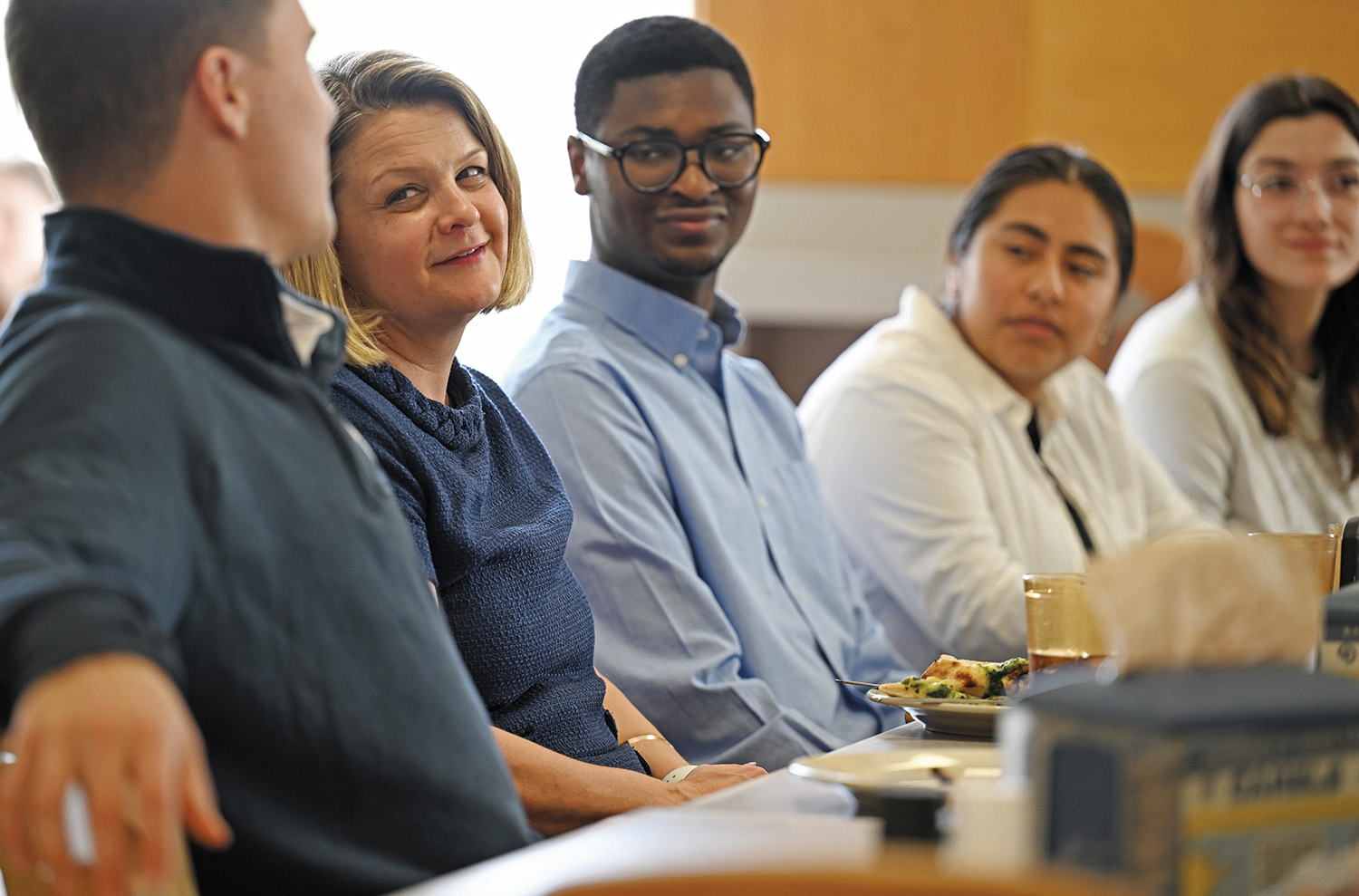
Educating the Educators
A conversation with the new presidents of Connecticut College and the University of Hartford — both hold degrees from the University of Connecticut.
By Claire LaFleur Hall
It took only a few minutes for Lawrence Ward ’92 (BUS) and Andrea Chapdelaine ’91 MA, ’93 Ph.D. to develop a friendship over, of all things, the construction of Gampel Pavilion.

Andrea Chapdelaine (left); Lawrence Ward (right)
As Huskies in the late ’80s to early ’90s, they didn’t know each other, but both lived close to the stadium and watched it being built prior to its 1990 grand opening. Chapdelaine describes watching construction workers eat lunch through the windows of her dorm. Ward vividly recalls chanting U-C-O-N-N with Big Red during the inaugural basketball game — when the UConn men beat St. John’s 72–58.
“In those days you could walk into the games without a ticket,” Chapdelaine says, moving on to Memorial Stadium memories. “My friends and I always went to the football games — to be seen,” says Ward, laughing.
In a fateful twist, these two higher education leaders returned to Connecticut to start new jobs last July. Ward left Babson College in Massachusetts to become president of the University of Hartford; Chapdelaine left the presidency of Hood College in Maryland to lead Connecticut College.
Although they’d been introduced once at an event, this virtual interview is the first chance they’ve had to get to know each other, sharing their views of higher education from the top and the ways they try to balance tremendous responsibilities with some serious fun.
Q: What drew you to Connecticut? Was it more than the job?
Chapdelaine: I was in my ninth year as president at Hood and was committed to several more. But I had taught at Trinity in the past, and I loved the similarities at Connecticut College, and also the distinctions. I felt I could do well here, and coming to Connecticut was a bonus. I’m only about an hour from my hometown of Chicopee, Massachusetts, and my husband is from that area too. It’s really nice to be close to family again.
Ward: There is something special about coming home. My family lived in Hartford since the 1940s. My father escaped the Klan in deep Georgia, and Hartford became his landing place. So for me, it is powerful to come back to the place that was a refuge for my father. The city provided refuge and new beginnings for both of my parents. My mother came to Hartford as a young girl after her father died. My grandmother worked for the Hartford Electric Company here as a chambermaid. I had some of my grandmother’s HELCO service pins made into cufflinks and wore them at my inauguration.

Ward seeks student time when he wants to “lean into the joy” of a job that provides no shortage of challenges.

Chapdelaine says spending time with students refills her “gas tank.”
Q: When people ponder whether higher education delivers ROI, what do you say?
Ward: There’s no question college offers enormous return on investment, from a financial standpoint to career opportunities to a society with greater prosperity and innovation. I think that what concerns people is that higher education has been slow to adapt to an evolving marketplace. We need to be far more innovative and build from the learner in rather than from the faculty member out.
Chapdelaine: I get asked that a great deal, and the answer is that data supports the decision to attend college. As a college graduate, you’ll earn more over your lifetime, you’ll be healthier, less likely to divorce, and more civically engaged.
But I think when people ask that question, they’re looking for reassurance that the investment is worth it, and that colleges are thoughtful about those concerns. Data only gets us so far. We need to do a better job telling our narrative. I think that question requires attention and caring, not just a one-size-fits-all response.
Ward: My son started at NYU during COVID, and one day he called me and said, ‘I don’t want to go to college anymore.’ I said, ‘You do know what I do for a living, right?’ He was studying photography and just didn’t see the value.
We have to be aware of how we deliver a college education and prepare students for careers. I told my son that we would support the path that he felt was right for him. When he is ready for more formal education, there will be plenty of opportunities for him to pursue it — including at the University of Hartford!
Q: So how do you keep college contemporary and impactful in a world that is changing so quickly?
Ward: I come from Babson College, which is known as one of the most entrepreneurial, innovative colleges in higher education. I see a future that is increasingly more learner-centric, perhaps courses and degrees of shorter duration, more just-in-time learning that purposely impacts lives. For example, I think for an emotionally mature learner with a clear career objective, a 90-credit-hour bachelor’s degree completed in three years makes good sense. It would be a more attractive option academically and financially for many students and families.
Chapdelaine: The only thing I’d add is that to the extent we’re able to, we need to empower students on their pathway. So many times they pick a major based on something they’ve seen on TikTok or what their parents see as a fit for them. I tell students to follow their passion, get excited, learn how to learn, ask questions, and find answers. That leads to deeper learning and richer experiences outside the classroom. The goal is to develop leaders who are intellectually courageous, inventive, resourceful, and resilient problem solvers.
Ward: It isn’t career prep versus liberal arts. Experiencing multiple disciplines enhances everything you do. The older you get, the more you realize the importance of making those connections.
Chapdelaine: Exactly! I didn’t major in college presidency. I like to talk about what got me here. I tell my students these things to help them feel empowered to pursue their passion and the career will follow. They shouldn’t just be looking at earning ratios for the major. [Chapdelaine majored in psychology and justice studies; her master’s and doctorate are in social psychology.]
Ward: We have a new accounting director who studied music at University of Hartford, earned an MBA, and then went into accounting. He comes to our university with a great appreciation for everything we do here.
Q: What is your favorite memory from UConn?
Ward: I have so many! As an undergraduate student, I experienced a lot of firsts. I fell in love, attended my first real party, worked as a business communications teaching assistant for professor Minerva Neiditz, served as vice president of the undergraduate student government, spoke at admissions events. I had a lot of light-bulb moments.
Chapdelaine: As a graduate student, I had a different experience. We were a small group of about 10, and we were very tight-knit. We enjoyed talking about our interests, and the faculty were amazing.
The first course I taught was Intro to Psych for Honors students. I realized that teaching could be a path for me. That was the moment I said, ‘This is how I’m going to impact the world.’ UConn played a big role in my career and my life. The faculty set me on a path to success, and I am really grateful.
My husband and I also had our first date at Willington Pizza. We went back recently and it hadn’t changed at all — and the pizza was still as good as I remembered it!
“Education, and life, are not passive experiences.”
Q: And the best lesson you took with you from UConn?
Chapdelaine: I learned how to be an advocate for myself. I wasn’t even 22, I was young, short, female, and on the shy side. I had to learn to say what I wanted. I learned to grow into my own, to develop confidence that I had something to contribute, not be passive about my destiny — and demand a piece of the pie. The change over the years was very significant.
Ward: The friends I met and the affection we have for one another and for the University, even 30 years later, made such an impact. My UConn friends and I may not talk for a year, but when we do, we just fall back into time. When I’m screaming at the TV while watching a UConn basketball game, I am reminded that UConn played such a large part in my development as a whole person. I’m grateful to be a UConn-for-lifer.
During my undergraduate experience I learned that education, and life, are not passive experiences. You get out what you put in to it. That’s the same advice I share with students and my own daughter, who is in college.
Q: What is the craziest thing you’ve ever done as a higher ed leader?
Chapdelaine: Every year I do a role reversal where the student is president and I am the student. I’ve practiced sports, taken ceramics, done rounds as an RA. Doing that with students was a lot of fun.
Ward: Some years ago I was thinking about revising student orientation. I took videos of old Motown songs and reworked the lyrics to help families understand aspects of going to college. I’m working on revising it for the University of Hartford.
Music is a big part of my life, and to sing and dance to the Temptations, Diana Ross, and Stevie Wonder in front of the entire campus is a very cool experience.
For parents who are just feeling some kind of way about their child going away to school, I play “Ain’t Too Proud to Beg” by the Temptations: “If I have to sleep on your doorstep all night and day, just to keep you from walking away. Let your friends laugh, even this I can stand. ’Cause I want to keep you any way I can. Ain’t too proud to beg."
Q: What is your best advice for each other?
Chapdelaine: I think it is really important to know yourself, because being a college president can be very hard. There’s a barometer in me that says, “It is time to spend some time with students” because that refills my gas tank. That’s where I find my joy. One quick conversation with a student can turn your day around.
Ward: I use the word “joy.” Lean into the joy of the job as often as you lean into the challenge. What a privilege it is to share our students’ journeys. That puts the wind in my sails.
